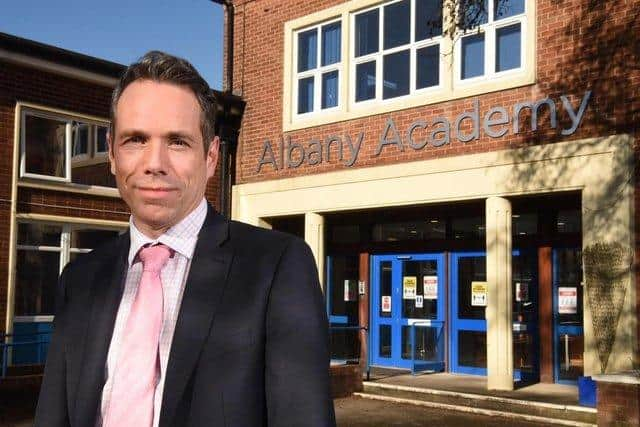Schools White Paper: Chorley headteacher welcomes the government's proposals but points out inconsistencies
and live on Freeview channel 276
Its measures include the introduction of a 32.5 hour minimum school week, compulsory memberships of multi-academy trusts and more intervention with children failing English or Maths.
One local headteacher, Peter Mayland, of Albany Academy in Chorley has shared his views on the government’s proposals, which “in the main”, he says “was a very positive white paper.”
Advertisement
Hide AdAdvertisement
Hide AdPeter told the Post: “I like the approach around collaboration, the use of evidence based practices, and the fact that it continues a lot of things that are already in place, for example, the national tutoring programme, the Education Endowment Foundation [which focuses on the poorest pupils], the Oak Academy [online learning resource], and also that focus on the continued development of teaching.”


Regarding one of the standout proposals, the move to academisation for all schools by 2030, Peter says he generally welcomes this, with Albany Academy already having been a member of a multi-acamedy trust for over a year.
“If trusts are set up well, and run well then it's a really powerful method of school improvement, so for us as a trust, it's not about saving money, it's about collaboration, and if trusts are operating in that way, then they've got far more flexibility than a local authority”, he said.
However Peter notes that the paper does contain “some inconsistencies and a lack of clarity”, including within the total academisation proposals which he calls “a tall order.”
Advertisement
Hide AdAdvertisement
Hide AdPeter added: “A change included is that local authorities can now run trusts, which seems inconsistent with another positive step that the white paper’s taken, which was to really clarify the role of academy trusts versus local authorities, but then to have local authorities running trusts, I'm not sure how they can manage to do both.”
He also says that the minimum 32.5 hour school week baffles him, not only because it affects few schools, with most (including Albany) already doing so, but also because it’s “the wrong number to focus on.”
Peter explained: “They’re talking about the number of hours that a child is learning, but within that 32 and a half hours, you're doing more than just teaching lessons, so the schools that differ, they're probably still teaching five hours a day, it's the break and lunchtimes that will be different. And if schools have got a much shorter week, it's probably because of particular needs of that area, for example maybe they've got a high proportion of children being bussed in; or they're trying to innovate, and spend more time training staff, therefore taking the less is more approach.
“They also don't provide an evidence base to say that 32 and a half hours is the optimum time that schools need to be open, so it’s out of place. I think governments are well positioned for that big picture thinking and setting direction for schools to follow, rather than trying to mandate on the nitty gritty.”
Advertisement
Hide AdAdvertisement
Hide AdOne way in which the government does provide direction to schools, is the funding provided, and the white paper included the promise of £1.8 billion worth of condition allocations across England for 2022-23 to help maintain and improve the condition of school buildings and grounds, and £86 million to grow and strengthen multi-academy trusts over the next three years.
Although Peter says it is too soon to know how that money cascades down to schools, he has hopes for what it will entail.
He said: “I'm looking forward to seeing the detail about the tutoring programme, which is a great thing but it's been really difficult to implement because it's not fully funded, there’s been high number of staff absences, and it's had a lot of strings attached to it. If we were given money for tutoring, but had far more flexibility around how we organise and manage that, that would make it much easier, so I hope that any funding that comes direct to schools doesn't have quite so many strings attached.
“And moving teacher starting salaries to 30,000 pounds per annum is a powerful stat, but the government needs to make sure that the overall funding for schools actually matches that and make that affordable for individual schools.”
Advertisement
Hide AdAdvertisement
Hide AdDespite being overall pleased with the white paper, Peter adds that he has one major criticism in that “it doesn't address issues around student wellbeing.”
Although the government says that every school will have access to funded training for a senior mental health lead to deliver a whole school approach to health and wellbeing, Peter explains this is not enough.
He said: “It’s great that they’re putting the training in, but schools have got to have the capacity to have that member staff, and you probably need more than one. In both our schools, we've got specialists, and they don't have the capacity to deal with all of the issues on their own. So I welcome training, but it's more about being able to have the size of team that can really support all the children in the school.
“Schools are having to deal with a huge amount around mental health and wellbeing, that has been increasing year on year for the last 15 years, but it's been particularly acute because of the implications of lockdowns and Covid, so it's a shame that there's nothing on that."
